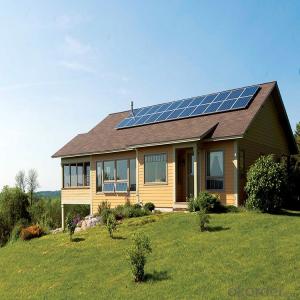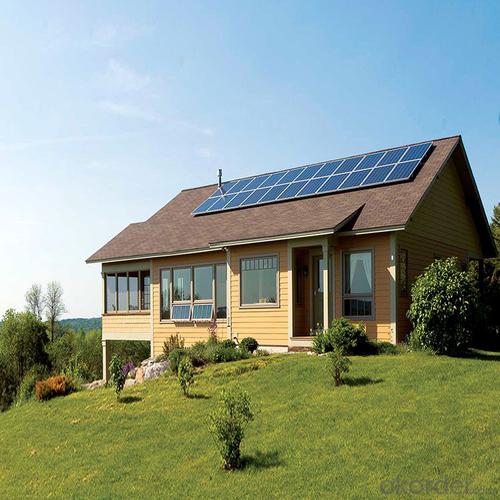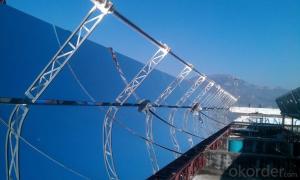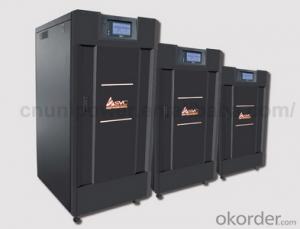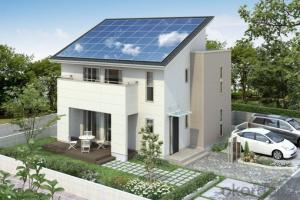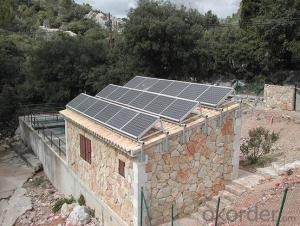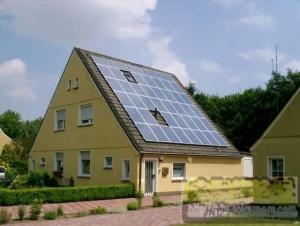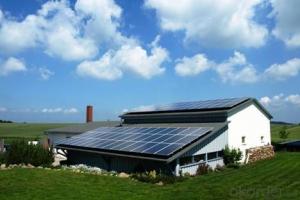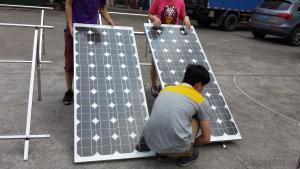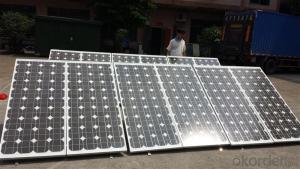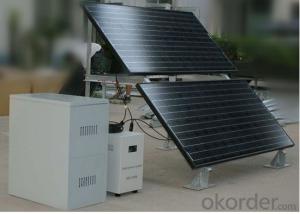Solar Energy Systems NYC:5kw-50kw Solar Roof Mounting Systems, Off Grid Solar Power Systems
- Loading Port:
- Shanghai
- Payment Terms:
- TT OR LC
- Min Order Qty:
- 1 set
- Supply Capability:
- 10000 set/month
OKorder Service Pledge
OKorder Financial Service
You Might Also Like
Specification
Off grid solar power systems is a kind of energy-saving and environmentally friendly system. It is a system uses PV modules to convert sunlight into electricity. It's made up of PV module, controller, battery and inverter. It is mainly used in some remote and power unstable areas. Solar power system is mainly used to drive all kinds of household electrical appliances and office equipment, to solve the power shortage situation without electricity or people living or working electricity problem.
This Solar system not only have solar power system function, but also have Utility complementary function. When main power off , the solar system can switch automatically to take use off solar power from battery to run load, When solar power not enough and power off, it can switch automatically to main power and connect with grid electricity take use of main power .at the same time charging battery.


Off-grid solar power systems can be applied to the villa, household, tourist resorts, prairie areas, remote mountain village, no power supply areas, farms, villages, island, highway and any regions to generate electricity.It can load household appliances like TV, Air Conditioner, refrigerator, lighting, washing machine, etc.

We supply a range of custom designed off-grid solar power systems. The off grid solar system are designed specifically for your project, based on your electricity needs and the location of the building.

- Q: Can a solar energy system be installed on a tile roof?
- Yes, a solar energy system can be installed on a tile roof. However, it may require additional considerations and precautions compared to other types of roofs. Tile roofs are often more fragile and delicate than other roofing materials, so special care must be taken during the installation process to avoid damaging the tiles. This may involve hiring experienced and skilled solar installers who are familiar with working on tile roofs. Additionally, the weight of the solar panels and mounting equipment must be taken into account, as tile roofs may have weight restrictions. Reinforcements or additional support may be necessary to ensure that the roof can handle the added weight of the solar system. Proper sealing and waterproofing are also crucial when installing solar panels on tile roofs to prevent any leaks or damage to the roof structure. This may involve using specialized mounting brackets and flashing to create a watertight seal around the tiles. In summary, while it is possible to install a solar energy system on a tile roof, it is important to consult with professionals who have experience working with tile roofs and can ensure that the installation is done correctly and in compliance with all safety and structural requirements.
- Q: What are the components of a solar energy system?
- A solar energy system consists of several key components that work together to harness the power of the sun and convert it into usable electricity. The main components of a solar energy system include: 1. Solar Panels: These are the most recognizable element of a solar energy system. Solar panels, also known as photovoltaic (PV) panels, are made up of multiple solar cells that convert sunlight into direct current (DC) electricity. They are typically mounted on the roof or ground to capture sunlight. 2. Inverter: The DC electricity generated by the solar panels needs to be converted into alternating current (AC) electricity, which is the type of electricity used in homes and businesses. An inverter is responsible for this conversion process, ensuring that the electricity can be used by various appliances and devices. 3. Mounting System: Solar panels need to be securely mounted on rooftops or on the ground. The mounting system consists of racking or frames that hold the panels in place and allow for optimal sunlight exposure. The mounting system also ensures that the panels are installed at the correct angle and orientation to maximize energy production. 4. Electrical Wiring: Proper electrical wiring is crucial to connect the solar panels, inverter, and other components of the solar energy system. The wiring carries the electricity from the panels to the inverter, and then to the electrical panel of the building, where it can be distributed and used. 5. Batteries (Optional): In some solar energy systems, batteries are included to store excess electricity generated during the day for use during the night or during periods of low sunlight. These batteries store the excess energy and release it when needed, allowing for a more consistent and reliable power supply. 6. Monitoring System: Many solar energy systems come with a monitoring system that allows users to track the performance and energy production of their system. This can be done through a web-based platform or a smartphone app, providing real-time data on energy generation, consumption, and savings. 7. Grid Connection (Optional): Solar energy systems can be connected to the electrical grid, allowing excess electricity to be fed back into the grid when the system produces more energy than is being used. This is known as net metering, and it allows homeowners to earn credits or receive compensation for the excess energy they generate. Overall, a solar energy system is a complex and interconnected set of components that work together to harness the sun's energy and convert it into usable electricity for various applications. These components enable individuals and businesses to reduce their reliance on traditional fossil fuel-based energy sources and contribute to a cleaner and more sustainable future.
- Q: How much space is needed to install a solar energy system?
- The space required for installing a solar energy system varies depending on the size and efficiency of the system. On average, a typical residential solar panel installation can require anywhere from 100 to 400 square feet of roof space. However, ground-mounted systems may require larger areas, ranging from a few hundred to several thousand square feet. The specific space requirements should be determined by conducting a site assessment and considering factors such as energy needs, location, sunlight availability, and panel orientation.
- Q: How does the orientation of solar panels affect their performance?
- The orientation of solar panels plays a crucial role in determining their performance and efficiency in harnessing solar energy. The ideal orientation of solar panels is to face directly towards the sun, maximizing the amount of sunlight they receive throughout the day. In most cases, solar panels are installed on rooftops or mounted on frames, allowing them to be adjusted to the desired angle. The optimal orientation depends on the geographical location of the solar panels, as well as the season and time of day. When solar panels are angled towards the sun, they are able to capture the maximum amount of sunlight, maximizing their efficiency. If solar panels are not properly oriented, they will receive less sunlight and produce less electricity. In the northern hemisphere, solar panels are typically installed facing south to capture the most sunlight throughout the day. Conversely, in the southern hemisphere, solar panels are oriented towards the north. This south or north orientation allows the panels to receive sunlight for the longest duration during the day. The tilt angle of solar panels also affects their performance. The ideal tilt angle is typically equal to the latitude of the location where the solar panels are installed. However, this angle can be adjusted to optimize energy production during different seasons. For instance, in winter, the panels can be tilted at a steeper angle to capture more sunlight, while in summer, a shallower tilt angle can prevent overheating. If solar panels are improperly oriented, their performance can be significantly reduced. In such cases, they may not generate the expected amount of electricity, resulting in lower energy output. Therefore, it is crucial to consider the orientation and tilt angle when installing solar panels to ensure maximum efficiency and optimal energy production.
- Q: What is the role of solar batteries in storing excess solar energy?
- The role of solar batteries in storing excess solar energy is to capture and store the energy generated by solar panels during periods of high sunlight. These batteries allow for the energy to be stored and used at a later time, such as during the night or on cloudy days, ensuring a continuous supply of electricity from solar power even when the sun is not shining.
- Q: Can a solar energy system be installed on a flat roof?
- Certainly! Installing a solar energy system on a flat roof is indeed possible. In fact, flat roofs are often regarded as the perfect choice for solar panel installations due to their easy accessibility and unhindered exposure to sunlight. The installation process for flat roofs is relatively straightforward, as the panels can be directly mounted on the surface without requiring any additional structural modifications. Moreover, the angle and positioning of the solar panels can be optimized to maximize energy generation. However, it is crucial to take into account factors such as the roof's load-bearing capacity, available space, and potential shading problems during the installation planning phase. Seeking guidance from a professional solar installer or engineer can ensure a successful installation on a flat roof.
- Q: Can solar energy systems be used for powering electric vehicle autonomous driving systems?
- Yes, solar energy systems can be used for powering electric vehicle autonomous driving systems. Solar panels can be installed on the roof of the vehicle to capture sunlight and convert it into electricity. This electricity can then be used to power the autonomous driving systems, including the sensors, cameras, and computer systems that enable the vehicle to navigate and make decisions on its own. By utilizing solar energy, the vehicle can reduce its reliance on fossil fuels and operate with reduced carbon emissions. However, it's important to note that the amount of power generated by solar panels may not be sufficient to solely power the entire autonomous driving system, especially during extended or cloudy periods. In such cases, the vehicle may still need to rely on grid charging or other charging methods.
- Q: Can solar energy systems be used in areas with frequent power outages?
- Yes, solar energy systems can be used in areas with frequent power outages. Solar panels generate electricity from sunlight, which means they can continue to produce power even when the main grid goes down. Furthermore, by integrating battery storage systems, excess solar energy can be stored and used during periods of low or no sunlight, ensuring a reliable power supply during outages.
- Q: Can solar energy systems be used in areas with high pollution?
- Yes, solar energy systems can still be used in areas with high pollution. While pollution may reduce the efficiency of solar panels to some extent, they can still generate electricity even in polluted environments. Furthermore, using solar energy can help reduce the dependency on fossil fuels and contribute to reducing pollution over time.
- Q: How do solar energy systems impact the transportation sector?
- Solar energy systems can have a significant impact on the transportation sector by reducing reliance on fossil fuels. Solar-powered electric vehicles (EVs) offer a sustainable and renewable alternative to traditional gasoline-powered cars, reducing greenhouse gas emissions and air pollution. Additionally, solar energy can be used to power charging stations for EVs, making them more accessible and convenient for users. This shift toward solar energy in transportation promotes a cleaner and more sustainable future.
Send your message to us
Solar Energy Systems NYC:5kw-50kw Solar Roof Mounting Systems, Off Grid Solar Power Systems
- Loading Port:
- Shanghai
- Payment Terms:
- TT OR LC
- Min Order Qty:
- 1 set
- Supply Capability:
- 10000 set/month
OKorder Service Pledge
OKorder Financial Service
Similar products
Hot products
Hot Searches
Related keywords
